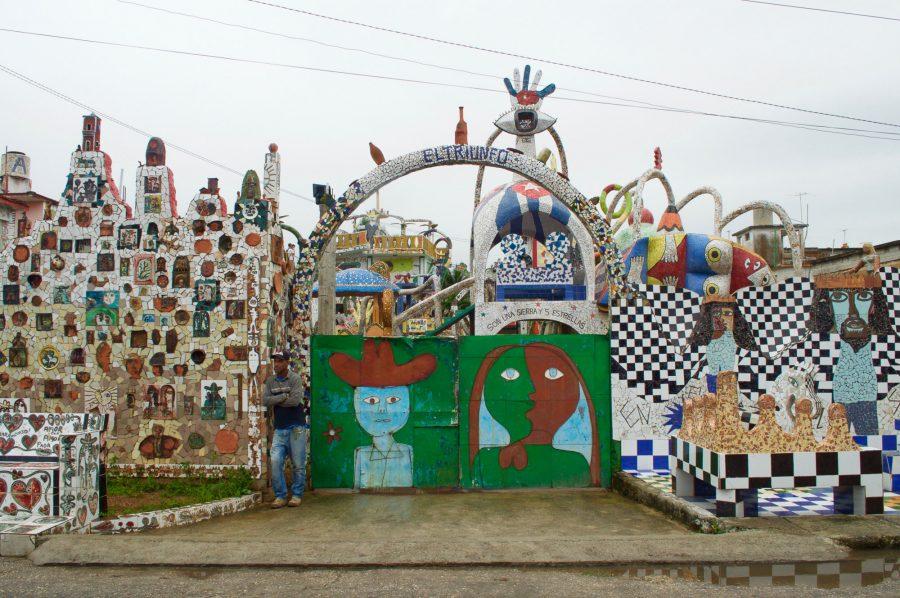Back in business: Students can now study abroad in Cuba
Photo Courtesy of Molly Wagener
A part of international artist Jose Rodriguez Fuster’s Fuster Project, a community beautification project that focused on bringing the community together though the rebuilding of tiled murals. A student took this photo when she studied abroad in Cuba in 2016.
October 20, 2016
After being one of the first schools to take students to Cuba, the University was forced by the United States government to shut down the educational trips. A decade later, professors were allowed to reopen the program.
Regulations on students traveling to Cuba loosened for the first time during the Clinton administration, allowing for former University professor Ivan Schulman to orchestrate the University’s first Cuban program.
However, a stark contrast was made apparent in 2004, when the Bush administration called for an embargo on the Caribbean island.
The Office of Foreign Assets Control within the Department of the Treasury banned educational programs that were less than 10 weeks in length. The University was forced to shut down the study abroad program, since the 20-day program did not meet the length requirements.
“Under Bill Clinton, things opened up and that’s how more of these programs came into existence,” said Dara Goldman, associate professor in Spanish and Portuguese. “Then under Bush, that shut back down, they essentially closed off a lot of these opportunities, restricted these programs.”
Get The Daily Illini in your inbox!
The politics of the embargo claimed that ending education-related programs would decrease the funds that would ultimately fuel Cuban dictator Fidel Castro’s regime.
“There are various reasons why the U.S. government did (the embargo),” Goldman said. “A lot of it was the politics of it and favoring to groups that were strongly in favor of the embargo. The one smaller reason why they did that was there were some programs taking advantage of the exchange program and used as a way to travel to Cuba as tourists.”
Goldman disagrees with the extent of the embargo, claiming there should have been better regulation of the small number of programs that weren’t actually educational instead of severely restricting educational travel.
“The programs that were educational, there was no reason to shut them down,” Goldman said. “As an educational institution, we should always support things to allow students to know more. I don’t see any value in limiting educational opportunities, I don’t see how it serves the interests of the embargo.”
It was 10 years later, in 2014, when the Obama administration lifted regulations on the Cuban embargo. That’s when the University began discussing bringing the Cuban program back.
Nils Jacobsen, a history professor, was a prominent leader in bringing back the program. He took the first group of students to Cuba in 2014, closing the gap between the embargo and the University.
The program took students to Cuba in 2015, and was planning for a 2016 trip, but could not guarantee the 10-student minimum that the Cuban university required.
Goldman, who has visited Cuba three times, said she hopes to take students in 2017, where she will be joining them as the University’s faculty leader.
Students in this program will spend most of their days in Cuba learning from Cuban intellectuals, professors and guest speakers at the Center for Marti Studies. The mornings will be spent in the classroom and the afternoons spent in Havana implementing the material.
“We can talk about music in the morning, and go to a music school, a performance, it’s a very multidisciplinary approach,” Goldman said. “To be able to not only approach these topics from a rich academic way, but to pair that with a hands- on, lived experience.”
Goldman said that while students can watch the news or listen to speakers in the States, there is an enriching experience in traveling to Cuba that can only be experienced by actually going there.
“(Cuba) is a society in transformation,” Goldman said. “That is an incredible opportunity to go to a place in which, not only can you see particular aspects of how that’s happening, but to actually be able to be in sustained contact with the people that are living through that. One of the things I tell my students is it’s like you could be in Berlin when the wall came down.”
In addition to the summer program, the University has other, shorter options available for those who cannot commit to the length or Spanish language requirement.
Nadia Gonzalez, senior in LAS, participated in a winter study abroad program to Cuba with the political science department in January.
“Studying there was fascinating and just learning in general about the life there and the people was a great opportunity,” Gonzalez said. “We were able to meet a variety of people who I think changed my perceptions a bit about the country.”
Gonzalez recommends the program, encouraging students to go while Cuba is still processing the new changes.
“Travel restrictions are starting to be lifted little by little, so I think going before the country begins changing is best, because one of the best parts about being in Cuba was seeing that it truly is preserved in a state of the past,” Gonzalez said.
Because the University’s Cuban program had been on hiatus for so long, Goldman sees that the reinstatement of the program is a good sign not only for the state of Cuban relations the United States, but for Cuba’s place in the world.
“The University is one of a number of institutions expanding their connections, their programs, because we already have improved relationships,” Goldman said. “There’s going to be a lot more questions of what exactly the U.S. and Cuban relationship is going to be.”







